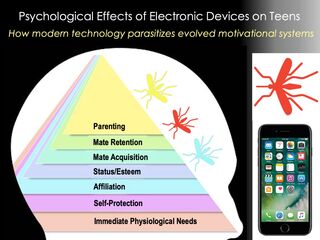Adolescence
7 Ways Electronic Devices Parasitize Teenagers' Brains
Modern technology exploits evolved fundamental motives.
Posted May 19, 2022 Reviewed by Jessica Schrader
Key points
- Modern technology is designed to appeal to a set of evolved human motives.
- The combination of powerful motives and efficient technology opens the door for robo-parasitism.
- Teenagers' use of electronic media can increase their loneliness and lower their grades.
Back in 1989, during a lovely scenic drive around the American West, I had frequent conversations of the following sort with my son Dave, then 12 years old:
“Look, Dave, it’s the Grand Canyon!”
“I can’t look now, almost up to 10,000 points on Super Mario!”
Fast forward 30 years, to the other day in my living room, and Dave’s teenage brother is being called to dinner.
“C’mon, dinner is getting cold! It’s your favorite Chinese food!”
“Can’t now, almost ready to level up on Elden Ring!”
Dave’s own two kids, sitting nearby, also ignored the call to dinner; each of them hypnotically absorbed in some apparently life-or-death task on their cellphones.
Last week, I gave a talk to a conference of pediatricians titled "Psychological Effects of Electronic Devices on Teens: How modern technology parasitizes evolved motivational systems." The talk dealt with a problem many of us face, whether or not we are teenagers or parents of teenagers: Modern technology is an equal opportunity parasite, efficiently designed and ever-improving in the ability to parasitize whatever motive is most important to you, me, or your Aunt Ethel in Iowa. Although I’m personally most worried about getting my descendants to come to dinner.

The talk develops a couple of ideas from the recently released book Solving Modern Problems with a Stone-Age Brain. I described a couple of those ideas in a recent post.
I noted that screen time among teenagers doubled with the COVID epidemic to almost eight hours per day (that’s not counting time in remote classes at school, incidentally). Electronic devices could, in theory, help teenagers—connecting them to one another, and providing access to educational information, for example—but the evidence suggests that more screen time is associated with poorer social relationships and worse grades in school (e.g., Giunchiglia et al., 2018; Twenge, 2017).
As I describe in the talk, modern technology artfully parasitizes a set of seven fundamental human motives—designed to help our ancestors survive, protect themselves from the bad guys, make and keep friends, get some respect, find mates, hang onto those mates, and care for our families.
In the modern world, however, those powerful desires are used against us, and against our teenage brothers, sisters, and children.
It’s not that the creators of electronic devices and the various apps running on them are evil; they are simply capitalizing on people’s powerful needs, in ways that, like the manufacturers of double chocolate fudge ice cream, bring immediate gratification, but sometimes downstream costs. And just as some forms of parasitism in nature are mutually beneficial (as in the case of clownfish and sea anemones), technology can be beneficial and profitable at the same time. But like chocolate fudge ice cream, it needs to be managed properly.
I suggest some solutions to the problem of robo-parasitism in this video.
Oh, and parents aren’t innocent either. Survey data I cite in the talk suggests that kids often complain their parents are distracted by electronic devices when the kids want to have a conversation.
I’d better get off this device, and see if I can get my son off his device, before he starves to death.
References
Giunchiglia, Zeni, Gobbi, Bignotti, & Bison, (2018). Mobile social media usage and academic performance. Computers in Human Behavior, 82, 177-185
Kenrick, D.T., & Lundberg-Kenrick, D.E. (2022). Solving Modern Problems with a Stone-Age Brain: Human evolution and the 7 Fundamental Motives. Washington: APA Books.
Twenge, J.M. (2017). Have smartphones destroyed a generation? Atlantic


